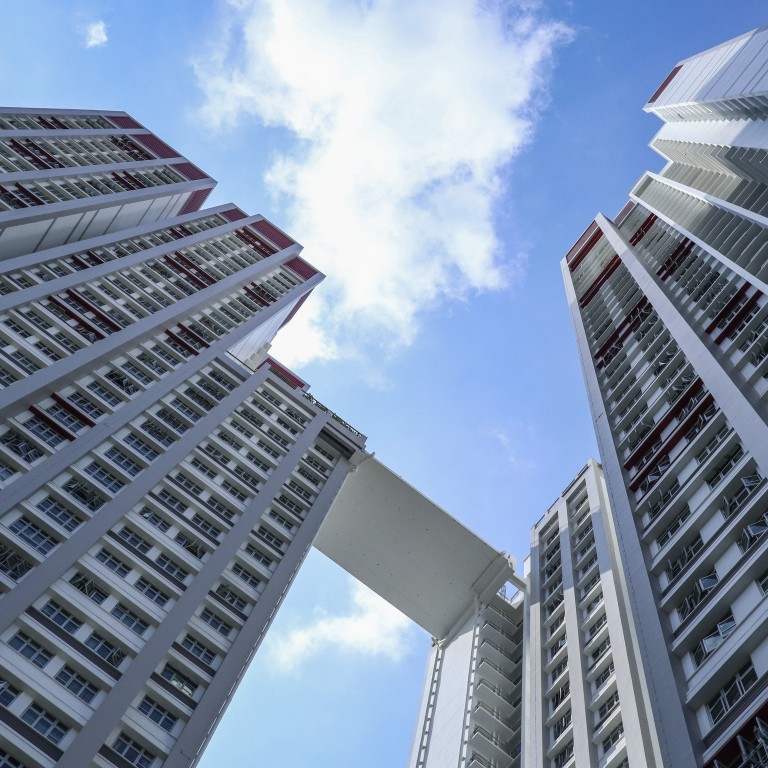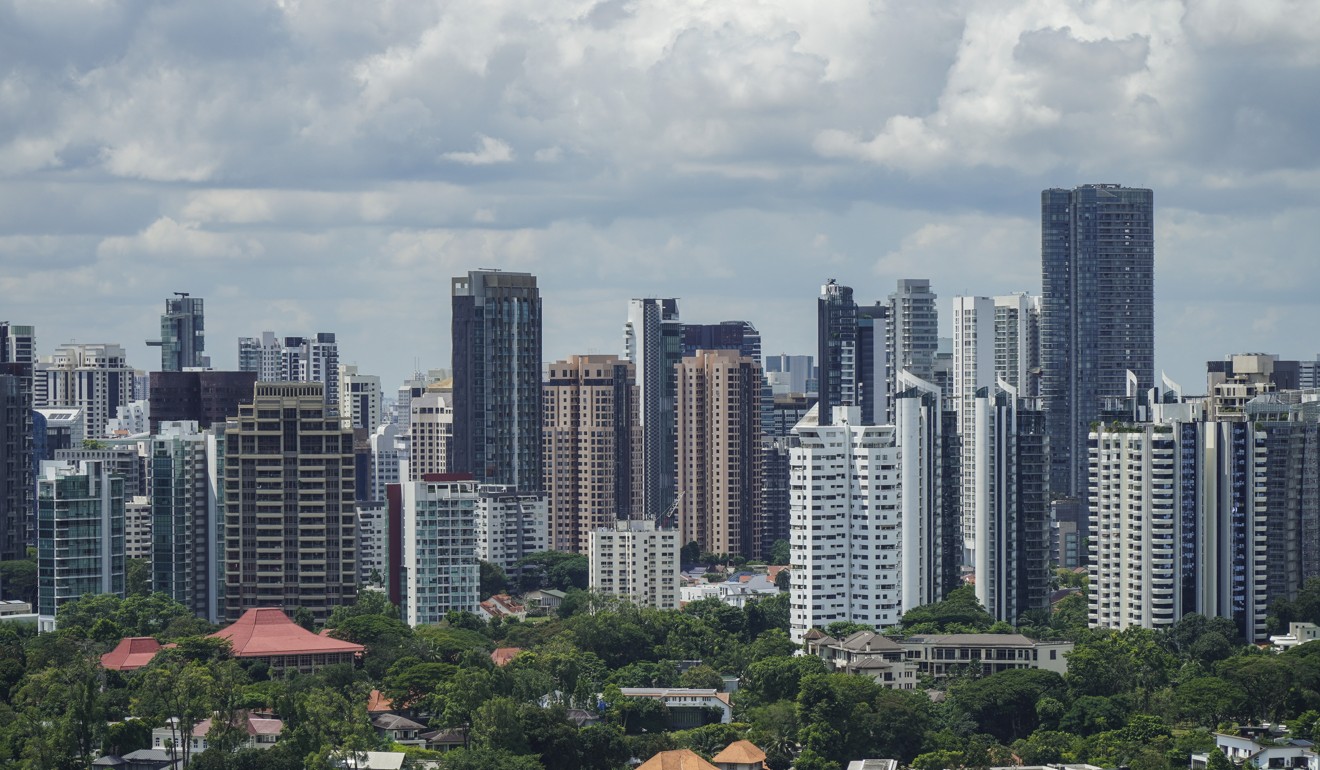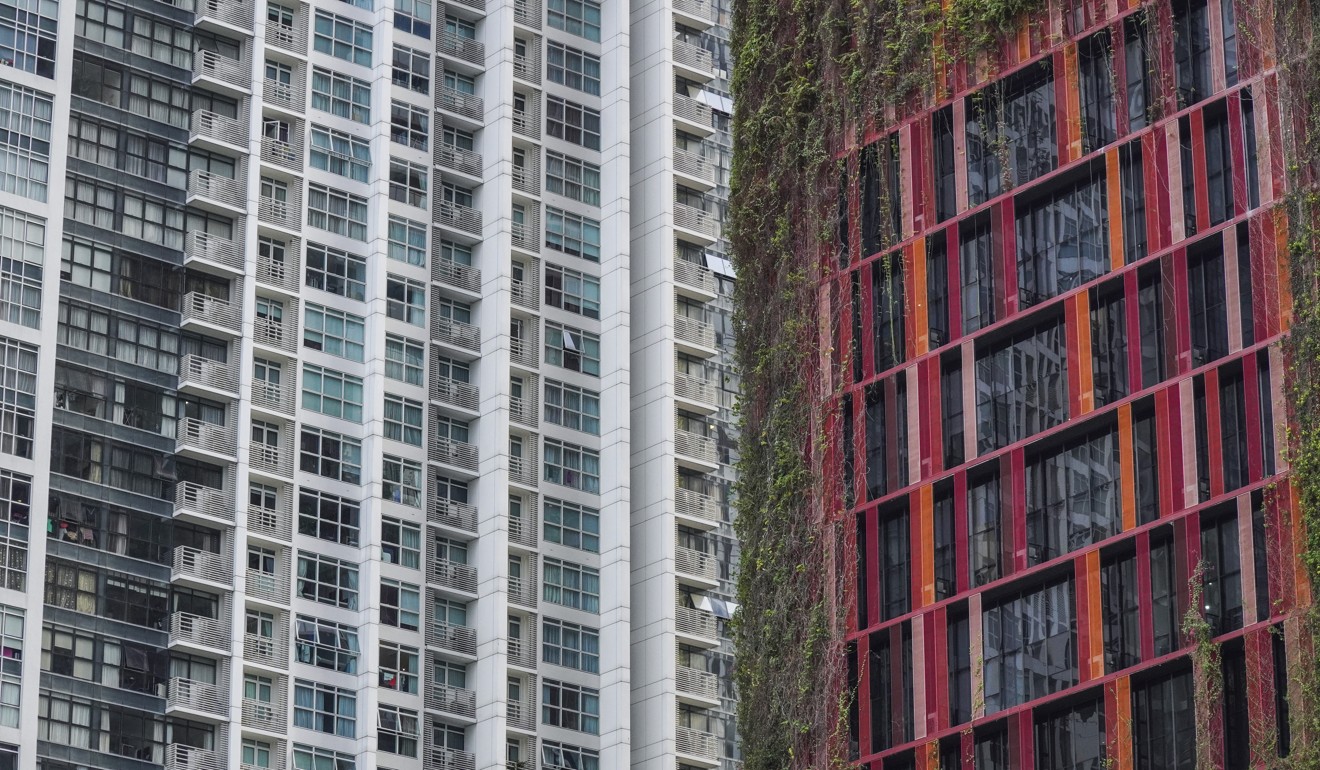
‘Hype, smoke, and hot air’ clouding Singapore real estate
- There is no shortage of optimism about the Lion City’s housing market, but experts say that confidence is misplaced
- Rising foreclosures and stagnating home loans growth against the backdrop of a worsening global economic outlook need to be taken into account
The project, One Pearl Bank, sits on a 99-year leasehold site once home to the iconic horseshoe-shaped Pearl Bank Apartments. It is set to stand among the tallest residential properties in the Lion City when completed by 2023, boasting unobstructed views of the city skyline.
Following the preview, developer CapitaLand revealed that the first weekend of sales saw homebuyers snap up 160 units – or 80 per cent of the 200 units released – at S$2,400 (US$1,741) per square foot.
This put the price for a one-bedroom flat of at least 527 sq ft, for instance, at around S$1.26 million (US$900,000). A 646 sq ft flat on Hong Kong Island cost an average of HK$11.1 million (S$1.95 million) in June.
Singapore back in play as more Hongkongers consider migrating
CapitaLand had trumpeted One Pearl Bank as “the bestselling new launch in Singapore’s Central Area year to date”. But a closer look at the numbers shows a different picture.
The transactions made up just 20.7 per cent of the 774-unit development. In comparison, just a year ago, before the latest round of cooling measures were introduced, opening-weekend sales for most projects typically accounted for a third of the full launch.
The Singapore government has in recent years rolled out various measures – from lower loan limits to higher taxes for investors and developers – to tame home prices, which surged in the early 2010s.
While optimism in the market has continued to bubble – supported by a rise in the private property market index, which latest data shows has risen to its highest level in five years – some, such as real estate consultant Ku Swee Yong, believe the optimism is misplaced. “I will sound like I am the most negative, anti-Singapore-property person … But the other indicators are not looking so positive,” he said. “There’s too much hype, smoke and hot air in this market.”

In other words, the lull that has gripped Singapore’s property market since its red-hot streak in the early 2010s could drag out further, buffeted by rising supply, a slow-moving rental market and a grim economic growth outlook.
It’s hard to say the market is hot right now
HALF FULL OR HALF EMPTY?
Desmond Sim, head of research for Singapore and Southeast Asia at real estate agency CBRE, also has reservations about the buzz in Singapore’s property market.
“It’s hard to say the market is hot right now,” he said. “Some months may have more launches than others. If there are no launches next month, then sales will be low. The more important thing to note is that supply continues to be stronger than demand. No projects have been sold out since June 2017.”
These insects are helping Singapore save the planet
As at the end of the second quarter, there were 50,674 uncompleted private homes (excluding Executive Condominiums, gated developments built by private developers on government-subsidised land) in the pipeline to enter the market over the next few years, of which 33,673 units were unsold. The Singapore government in June even decided to reduce the supply of private residential units through government land sales in the remaining six months of 2019.
Meanwhile, foreclosures, or defaults on mortgages, have been on the rise. The number of properties put up for auction, including re-listings, hit a record 778 in the first half of this year, based on data from real estate consultancy Colliers International since 2008. This was up 23 per cent from the previous six months, and 71 per cent higher than the same period a year ago.
Of the 778 listings, 362 were made by mortgagees – mostly banks that foreclosed properties in the residential and retail sectors. Analysts blamed the rise in foreclosures on tighter lending rules introduced by the government over the past two years, a situation compounded by weakness in the rental market.
The impact on investor demand is clear.
Growth in housing loans has stagnated, easing 0.2 per cent to S$202.2 billion in June from the previous month, and down 0.41 per cent from the same period last year.
This was largely due to property curbs rolled out last July, when the maximum loan for residential properties was cut from 80 per cent to 75 per cent, noted Ku, who is chief executive of real estate agency International Property Advisor.
Electric scooters, unicycles … why can’t Singaporeans just walk?
That said, the rental market appears to be on the mend, albeit slowly. Private home rental prices went up 1.3 per cent in the second quarter, and rental increases could pick up the pace with the completion of more well-located projects, said Tricia Song, head of research for Singapore at Colliers International.
THE WILD CARD
But the biggest factor that could hurt the property market is the worsening economic outlook.
The United States-China trade war is rapidly pointing to a global trade recession, an outcome that will have severe implications for Singapore’s open and trade-dependent economy. Flash data for the country’s second-quarter gross domestic product figures point to a much deeper slowdown than expected, with a mere 0.1 per cent year-on-year growth – the weakest since the 2007-2008 global financial crisis.
Exports tumbled 17.3 per cent in June from the same period a year ago, declining for the fourth straight month, while factory activity shrank 6.9 per cent year-on-year to clock its worst monthly performance since December 2015. “It’s a combination of global growth slowdown, trade war, China moderation and tech cycle issues,” said Selena Ling, head of treasury research and strategy at OCBC.

Unemployment has also crept up in recent months, with Singapore’s manpower minister Josephine Teo pledging government support should the slowdown result in further job cuts. Singapore’s citizen unemployment rate stood at 3.3 per cent as at June 2019, up slightly from 3.2 per cent in the first quarter.
The lessons from the last crises, especially the 1997 Asian financial crisis that caused a prolonged recession, should not be understated or forgotten
Should the economy slump and incomes fall, housing demand and prices will naturally follow, said Dr Sing Tien Foo, director of the National University of Singapore’s Institute of Real Estate and Urban Studies. Those who are highly leveraged or have taken on more loans than they can handle will face rising debt and mortgage default risks.
The rise and fall (and rise) of Sentosa Cove, Singapore’s ‘Monte Carlo’
“The lessons from the last crises, especially the 1997 Asian financial crisis that caused a prolonged recession, should not be understated or forgotten,” he said. “Similarly, the US subprime mortgage crisis in 2007 was rooted partially in overexuberance in the housing markets, which led to over-lending, especially the high-risk subprime loans.”
Some analysts are hoping the property cooling measures could be lifted as a result, but OCBC’s Ling believes they will remain in place. “Given that the cooling measures are for medium-term market sustainability, barring a very sharp downturn, the macroprudential measures are probably here to stay,” she said.
Recession or not, there may be some reprieve for the real estate market for now. Sim from CBRE noted that fears over higher interest rates were lifted somewhat after the US Federal Reserve last week cut interest rates for the first time in more than a decade.
And for all that global uncertainty, be it from the US-China trade war or Hong Kong’s social unrest, he believes Singapore is still “a safe haven for foreigners”. ■











